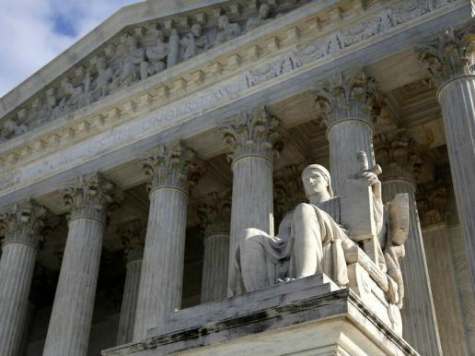When purchasing a firearm, federal law makes it a crime to make any false statement about “any fact material to the lawfulness of the sale.” Bruce Abramski is former police officer in Virginia who purchased a gun for his uncle in Pennsylvania. His uncle is law-abiding and could have bought the gun himself, but Abramski made the purchase to get a policeman’s price discount to save his uncle money.
The former officer was convicted for violating federal law in buying the gun. Today in Abramski v. United States, by a 5-to-4 vote the Supreme Court affirmed Abramski’s felony conviction.
In 2009, Bruce Abramski went to a gun store at his home in Virginia and purchased a firearm. He filled out all the required federal paperwork providing his own name and identifying information and passing a federal background check. He then traveled to his uncle’s home in Pennsylvania and delivered the firearm to a licensed gun dealer there. Abramski’s uncle then filled out the same federal paperwork and passed his own background check before he could take possession.
As part of that paperwork, Question 11a on Form 4473–created by the Bureau of Alcohol, Tobacco, Firearms, and Explosives (ATF)–asked whether you are the actual purchaser of the firearm (versus buying for another person). Abramski spoke to more than one gun dealer who said he could say he was the actual buyer.
Several federal appeals courts held this provision of federal law is designed only to prevent “straw man” sales, where a buyer obtains the firearm on behalf of someone who would be refused the sale after they failed a federal background check. In the Supreme Court’s words from 1976, Congress wrote this provision to “keep firearms out of the hands of those not legally entitled to possess them because of age, criminal background, or incompetency.”
Nonetheless, the U.S. Court of Appeals for the Fourth Circuit in Richmond (with jurisdiction over the Mid-Atlantic states) agreed with two other federal appeals courts in holding that when Abramski checked the box affirming he was the purchaser, he committed a federal felony.
If Abramski purchased the gun on his own, then decided to give it to his uncle as a free gift, that would be legal. Or if Abramski bought it for himself, then the following week decided to sell it to his uncle, that would be legal. But because his uncle wrote him a check for the gun before Abramski went to the store to buy the gun, and thus was acting as his uncle’s agent to buy a gun, Abramski committed a crime.
Abramski’s lawyer argued that Question 11a is never “material” to the lawfulness of the sale. The National Rifle Association and 26 states filed amicus (“friend of the court”) briefs making the narrower argument that Question 11a is only material when the final recipient of the firearm is in fact someone who cannot legally own a gun.
Justice Elena Kagan wrote for the 5-to-4 majority that Abramski’s argument:
would defeat the point of [this law], which tightly restricts the sale of guns to a person who does not appear in person at the [dealer’s] business premises… And even when an individual fits within that category, he still must submit to the dealer a sworn statement that he can lawfully own a gun….
Kagan later concluded:
No piece of information is more important under federal firearms law than the identity of a gun purchaser–the person who acquires a gun as a result of a transaction with a licensed dealer. Had Abramski admitted that he was not the purchaser, but merely a straw–that he was asking the dealer to verify the identity of, and run a background check on, the wrong individual–the sale here could not have gone forward. That makes Abramski’s misrepresentation on Question 11a material….
Justice Antonin Scalia, writing for Chief Justice John Roberts and Justices Clarence Thomas and Samuel Alito, dissented, explaining:
Abramski made a false statement when he claimed to be the gun’s “actual transferee/buyer” as Form 4473 defined that term. But that false statement was not “material to the lawfulness of sale” since the truth–that Abramski was buying the gun for his uncle with his uncle’s money–would not have made the sale unlawful… Therefore Abramski’s conviction on this count cannot stand.
Scalia noted that federal law imposes limits that address the concerns Kagan expressed for the majority. For example, federal law forbids anyone selling “a firearm to a person who he knows or has reasonable cause to believe falls within one of nine prohibited categories (such as felons, fugitives, illegal-drug users, and the mentally ill).”
He then reasoned, “But the government does not contend that either Abramski or his uncle fell into one of those prohibited categories. And no provision of [federal law] prohibits one person who is eligible to receive and possess firearms … from buying a gun for another person who is eligible to receive and possess firearms….”
On a separate point, Scalia adds:
We interpret criminal statutes, like other statutes, in a manner consistent with ordinary English usage. In ordinary usage, a vendor sells (or delivers, or transfers) an item of merchandise to the person who physically appears in his store, selects the item, pays for it, and takes possession of it. So if I give my son $10 and tell him to pick up milk and eggs at the store, no English speaker would say that the store “sells” the milk and eggs to me.
Thus, Scalia concludes, Abramski was the person buying the gun for purposes of federal law, not his uncle. Therefore, the dissent argued, the statute was never violated, and the conviction should be reversed.
Ken Klukowski is senior legal analyst for Breitbart News. Follow him on Twitter @kenklukowski.

COMMENTS
Please let us know if you're having issues with commenting.